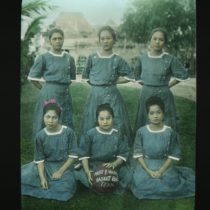Magazine

Voices from the Philippines
A history professor and her undergraduate research fellows bring fresh eyes to the fraught history of American imperialism in the Philippines.
by Robert Havey
Since 2015, the Michigan in the World program has brought undergraduate researchers to the Bentley for a deep dive into a particular historical moment or theme. In the summer of 2019, LSA History Professor Deirdre de la Cruz and her team of research fellows explored the Bentley’s archive for material relating to the Philippines during the first 35 years of American colonialization.
The Philippines had been a colony of Spain for centuries before it became a U.S. territory in the aftermath of the 1898 Spanish-American War. As part of the Treaty of Paris, Spain sold the Philippines, Guam, and Puerto Rico to the United States for $20 million. Filipino nationalist groups, who had been denied representation at the negotiations, fought unsuccessfully against their new colonial government. The Philippines would not be fully independent of the United States until 1946.
Professor de la Cruz’s idea for her Michigan in the World project was to explore this complex time in Philippine history through primary sources at the Bentley, with a focus on underrepresented voices including native Filipinos and women. This approach presented challenges, since much of the material about that era comes from the papers and records of American men. De la Cruz not only needed to plan on what materials the fellows would research, but also teach them how to dig deep enough to uncover the material’s hidden stories.
De la Cruz brought her idea for the project to the Bentley’s “Engaging the Archives” seminar in winter 2019. The seminar was an opportunity for faculty members from around the university to collaborate with archivists on how to use primary sources in their classrooms.
“For part of the seminar we were supposed to produce a syllabus where we would use something from the collections,” said de la Cruz in an interview with the Bentley. “What I decided to do was, rather than have my final assignment be a regular semester course, was to have it be this Michigan in the World project.”
De la Cruz used the seminar as an opportunity to discuss her concerns with archivists about the potential bias in the material. “I think I posed it as a challenge to everybody as to how we could, with an archive that might be so weighted in one direction in terms of who’s represented, think creatively about finding sources, hearing voices, and telling stories that problematize the bigger imperial picture.”
Ultimately, her Michigan in the World students were eager to tackle this challenge. After preliminary classes on the basics of archival research, they dove into boxes of material at the Bentley.
They found a collection of an American teacher who saved many of his students’ essays, which provided a rare opportunity to read firsthand accounts of life by native Filipinos. News reports from the Detroit News and the digitized Michigan Daily helped offer perspective on how the situation in the Philippines was viewed by Americans. “There were debates that were staged and then recorded in The Michigan Daily,” de la Cruz says, with opinions both in favor of and against colonization.
De la Cruz says that showcasing diverse perspectives was a critical component of the class. “It was really important to me that no group—American, Filipino—was seen as a monolithic category.”
The students’ research touched on many sensitive subjects, like racism, sexism, and violence, but de la Cruz says the undergraduates “brought a real level of maturity and thoughtfulness to these questions. They’ve been asking themselves: how do we research and write about this subject in a rigorous manner while still being able to take a critical angle to the history that it tells?”
Stipends for the students who studied the Philippines this summer were provided by the Jones Fund for Engaged Education, a gift from Bentley donor and U-M alumnus Thomas C. Jones (B.B.A, ’68, M.B.A. ’71), whose support will cover all the stipends for the students in this program for a total of five years.
This session of Michigan in the World is now complete, but the class will be building a website, and de la Cruz thinks there is an opportunity to expand the scope of the project to include multiple classes: “The idea is that the website that we build becomes the foundation for a continually growing digital exhibit and resource center for future teaching. There is so much [at the Bentley] that’s related to the Philippines, this project could really keep growing with every iteration of a course that I teach.”
